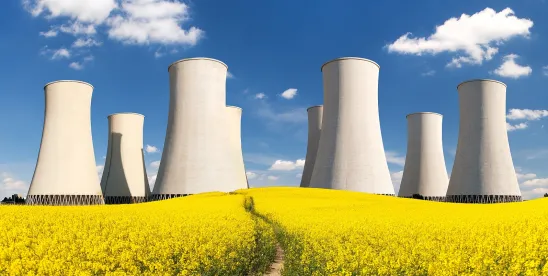The Texas Legislature recently passed three key bills: House Bill 14 (H.B. 14); Senate Bill 1061 (S.B. 1061); and Senate Bill 1535 (S.B. 1535), which introduce a comprehensive legal framework to promote nuclear energy in Texas, including uranium mining and workforce development. The bills are expected to be signed by Texas Governor Greg Abbott, who during the interim session instructed the Texas Public Utility Commission to establish an advanced nuclear working group to study and plan for the use of advanced nuclear reactors in Texas. The final report of the working group contains many of the recommendations on which these bills are based.
Key Provisions of the Advanced Nuclear Bills
1. Creation of the Texas Advanced Nuclear Energy Office
At the heart of H.B. 14 is the creation of the Texas Advanced Nuclear Energy Office (TANEO), a new agency housed within the Office of the Governor. [New Section 483.101(a) of the Texas Government Code]. TANEO is designed to facilitate advanced nuclear development in Texas by providing strategic leadership for the advanced nuclear reactor system in Texas, coordinating permits and regulatory efforts, engaging in public education and outreach, promoting the development of advanced nuclear reactors for dispatchable electric generation, creating high-wage manufacturing jobs, identifying barriers to nuclear project development, and supporting the creation of an in-state advanced nuclear supply chain. [Id. at subsection (b)]. The bill authorizes the Governor to appoint a Director of the Office to oversee and administer programs established under the Office [New Section 483.103 of the Texas Government Code] and a Nuclear Permitting Coordinator to assist developers with navigating federal, state, and local permitting requirements. [New Section 483.104 of the Texas Government Code].
2. New Grant Programs to Support Nuclear Development
H.B. 14 establishes the Texas Advanced Nuclear Development Fund, a dedicated account in the state’s General Revenue fund. [New Section 483.201(a) of the Texas Government Code]. The fund will support three new grant programs designed to reimburse expenses for qualifying projects using advanced nuclear technologies, including small modular reactors and microreactors. The Legislature has appropriated $350 million into the fund.
- Project Development and Supply Chain Reimbursement Grants. Reimburses up to 50% of eligible early-stage costs (e.g., feasibility studies, engineering, licensing work), capped at $12.5 million per project. [New Section 483.203 of the Texas Government Code].
- Advanced Nuclear Construction Reimbursement Grants. Covers up to 50% of qualifying construction costs, including Nuclear Regulatory Commission application fees and long-lead component procurement, with a cap of $120 million per project. Projects must have a construction permit or license application docketed with the U.S. Nuclear Regulatory Commission. [New Section 483.204 of the Texas Government Code].
- Completion Bonus for ERCOT-Connected Reactors. Provides performance-based grants for advanced nuclear reactors that reach commercial operation and connect to the ERCOT power grid. Award amounts will be based on the facility’s generation capacity determined on a per-megawatt basis. [New Section 483.205 of the Texas Government Code].
TANEO will evaluate each grant applicant based on the applicant’s quality of services and management, efficiency of operations, access to resources essential to the project, application for a permit or license with the U.S. Nuclear Regulatory Commission, ability to repay the grant if benchmarks are not met, and the project’s potential benefit to the state. [New Section 483.206 of the Texas Government Code]. H.B. 14 ensures that these grants are reimbursement-based and not up-front funding. [New Section 483.202(b) of the Texas Government Code]. Recipients must repay grant funds if project milestones are not met. [Id. at subsection (e)(2)]. The bill also prohibits grants to applicants who already received state-appropriated funds under certain conditions. [Id. at subsection (c)].
3. Legislative Oversight and Confidentiality
Before finalizing any grant award under H.B. 14, TANEO must provide notice to the Lieutenant Governor and Speaker of the House, who may jointly disapprove of the proposed grant within 30 days (with one possible 14-day extension). [Id. at subsection (d)]. Grant application materials are deemed confidential and not subject to public disclosure under the Texas Public Information Act. [New Section 483.207 of the Texas Government Code].
4. Streamlined Procedures for Uranium Mining and Production
S.B. 1061 streamlines the uranium-mining application process by reducing procedural delays and clarifying permitting rules. Specifically, S.B. 1061 amends the Texas Water Code to provide that applications for authorization or amendment to authorization can be uncontested if:
- the authorization covers a production area located within the boundaries of a permit that incorporates a range table of groundwater quality restoration values for each area;
- the restoration values for each production area are below the established range’s upper limit;
- the authorization covers a production area located within the boundaries of a permit that incorporates wells’ groundwater baseline characteristics as required by Texas Commission on Environmental Quality (TCEQ) rule; and
- the TCEQ mails the application’s notice of receipt to the county’s groundwater conservation district and surface and mineral owners in the area no later than 30 days after the TCEQ determines the application to be administratively complete. [New Sections 27.0513(d)(1) – (4) of the Texas Water Code].
These changes allow companies to avoid the full permitting process when amending applications and will apply to applications or amendments submitted on or after September 1, 2025. [S.B. 1061, Sections 3 and 4].
5. Creation of an Advanced Nuclear Energy Workforce Development Program
S.B. 1535 creates the advanced nuclear energy workforce development program to develop a talent pipeline for the anticipated advanced nuclear industry growth. The bill directs the Texas Workforce Commission (TWC) to create and administer this initiative. [New Section 302.0081(b) of the Texas Labor Code]. The TWC must collaborate with the Texas Education Agency and the Texas Higher Education Coordinating Board to assess labor supply gaps in the advanced nuclear energy industry, retain talent and strengthen the nuclear workforce pipeline [Id. at subsection (c)(1)(A)], and support the development of academic and training programs in nuclear-related disciplines. [Id. at subsection (c)(2)]. The bill also authorizes support for public-private partnerships to create nuclear career awareness, academic pathways into nuclear fields, workforce training programs offered by public colleges and technical schools, and research and leadership development at general academic institutions. [Id. at subsection (c)(1)(B)]. Overall, S.B. 1535 intends to increase workforce capacity to meet the anticipated growth of Texas’s advanced nuclear energy industry.
What Adoption of these Bills Means
Collectively, these bills represent a landmark for nuclear energy in Texas. They institutionalize state-level support, from permitting coordination to sizable grant and workforce development. With full gubernatorial backing and alignment with established energy needs, lawmakers and industry are positioned to see a major shift in Texas’s energy portfolio. For the energy sector, emerging nuclear capacity could greatly strengthen much needed grid resilience, drive economic activity in project development, manufacturing and finance, and signal that Texas is preparing for diverse and reliable power sources in addition tofossil fuels and renewables.





 />i
/>i
